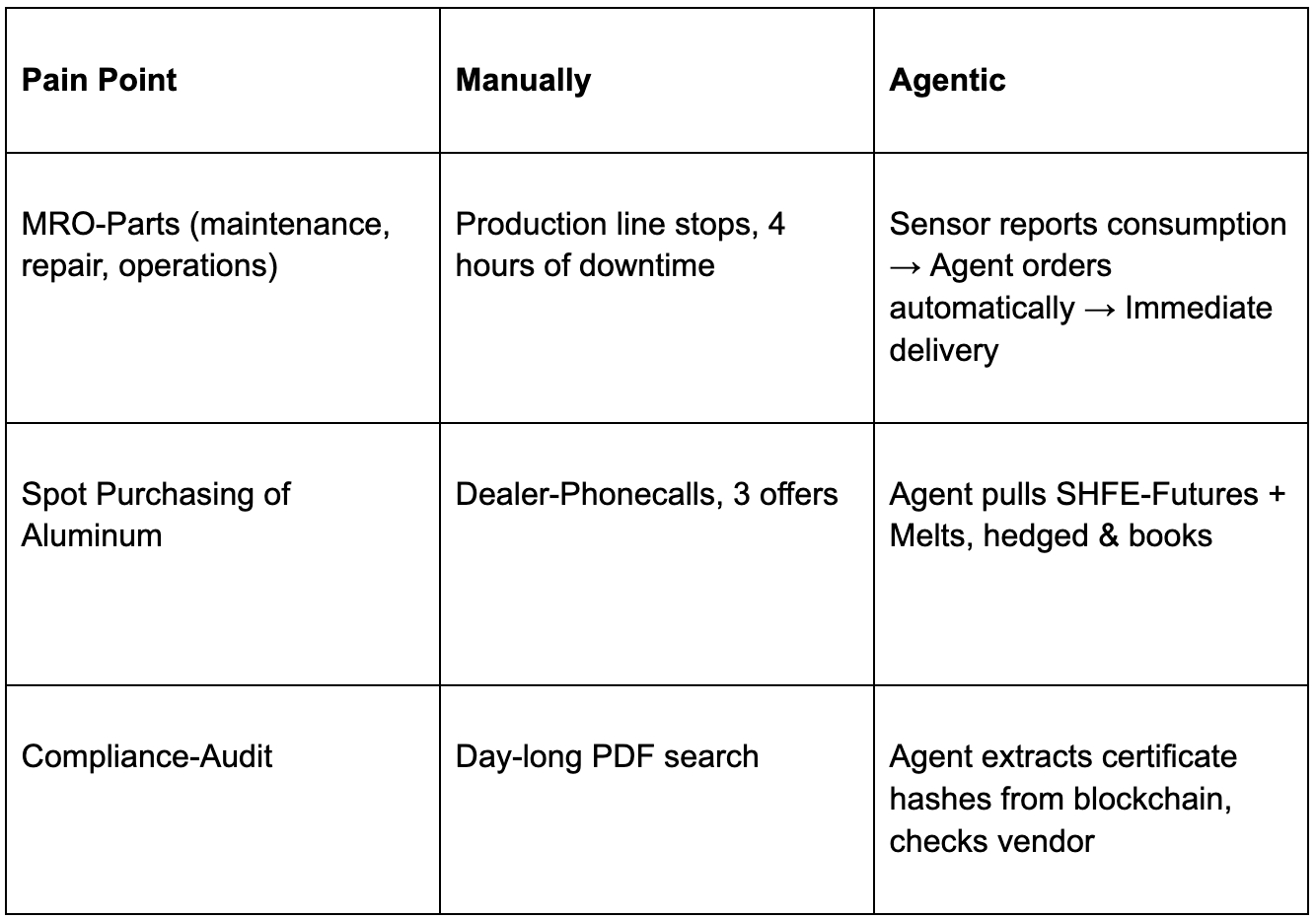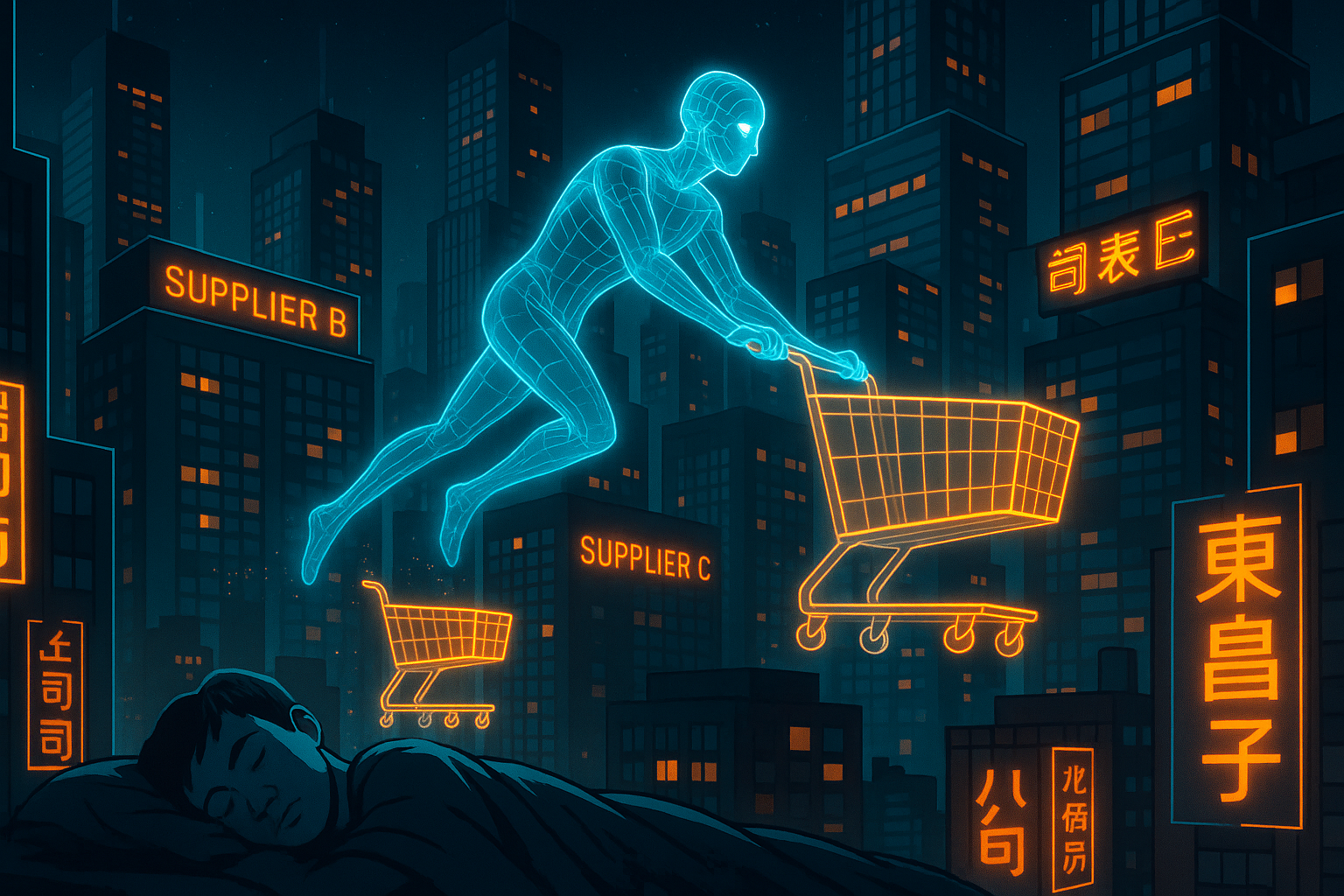“In the next three years, you will spend more time optimizing for an algorithmic buyer than for a human one.”
Product Manager at Alibaba Accio, Hangzhou, May 2025
What “agentic commerce” really means
Agentic commerce describes a new era of shopping in which autonomous AI agents (not simple chatbots) shop independently on behalf of their users. Of course, all commerce platforms now offer AI enhancements. But the key difference to agentic commerce is the empowerment to act. What does that mean?
These agents:
- Understand goals: “Keep my factory running with < 2% downtime for the next 30 days.”
- Break down the goal into subtasks: Predict consumption → Check stock levels → Evaluate suppliers → Negotiate prices → Trigger order.
- Trade independently via websites, APIs, and digital wallets - without a human click.
- Use memory, tools, and reasoning loops to compare prices, negotiate, and finalize purchases - while we sleep.
- As a result, shopping is shifting from human interaction to machine-to-machine transactions to so-called “zero-click commerce".
Why B2B is the most exciting test field
While consumer goods are often bought emotionally, industrial purchasing is KPI-driven. This is where agents develop their strengths particularly quickly.
They reduce the classic 6-step process (requirement → RFQ → quotation → order → invoice → goods receipt) to milliseconds.
Examples of early use cases

Agent Store Optimization (ASO): SEO for machines
When machines are the buyers, product catalogs must be machine-readable. This gives rise to the new field of Agent Store Optimization (ASO) - the sister discipline of SEO for online stores in the B2B sector.
ASO Checklist (already live on Alibaba.com & JD-MRO):
While classic marketplace optimization aims to help people find and understand products, ASO is about structuring data in such a way that machines can process it directly. Those who optimize at an early stage have the chance to remain visible in a world of automated procurement - and to be at the top of the rankings. Here are a few initial approaches:
- Attribute completeness (95%) - machines do not "see" images, they parse JSON.
- Compliance tokens - REACH, GB, ISO as key-value pairs, not as PDFs.
- Price arrays - {qty:100, price:1.20, lead:7} instead of free text.
- CO₂ footprint per unit - EU agents automatically filter out products > 2 kg CO₂e.
- Agent rebate - cashback to the agent's wallet, not to the human buyer → better ranking chances.
- Merchants who achieved over 80% ASO fulfillment saw +62% agent-driven RFQs within 60 days.
Five Trends from China (Q2 2025)
China is once again a pioneer in B2B trade. Agents already play a central role there.
Trend 1 - Lights-Out Procurement (MRO)
- JD-MRO “JingAgent" already handles 28% of platform GMV in electronics factories.
- Auto-orders with CMMS min/max alerts → average downtime: only 1.4 h/month.
Source: https://www.linkedin.com/pulse/b2b-marketing-china-2025-driven-tech-gentlemen-marketing-agency-kecqe
Trend 2 - Cross-border RFQ Factories
- Alibaba Accio creates 40% of all RFQs for 2 million buyers abroad.
- Sourcing packages (market analysis, HS code, supplier shortlist) in < 90 seconds.
Source: https://www.linkedin.com/pulse/b2b-marketing-china-2025-driven-tech-gentlemen-marketing-agency-kecqe
Trend 3 - Agent-only Pricing
- Special “agent prices” only for verified bots.
- -3% margin, but +19% volume → +11% net profit through speed of sales.
Source: https://www.coveo.com/blog/the-rise-of-agentic-commerce/
Trend 4 - Government Mandates
- Hangzhou Cross-Border Pilot Zone requires open agent APIs for advance customs declarations.
- Result: Declaration time decreases from 24 hours to 45 minutes.
Source: https://www.linkedin.com/pulse/b2b-marketing-china-2025-driven-tech-gentlemen-marketing-agency-kecqe
Trend 5 - Multi-Agent Orchestration
- State Grid uses three agents (demand → compliance → auction).
- Savings: USD 120 million in 12 months through 6% cheaper bids.
Source: https://www.linkedin.com/pulse/b2b-marketing-china-2025-driven-tech-gentlemen-marketing-agency-kecqe
These trends are blueprints for Western markets.
Recommendations for Brands & Distributors
To be successful with Agent Store Optimization (ASO) right from the start, brands, and distributors should consistently align their processes and data with machine-readable standards. It is no longer enough to simply present products in a way that humans can understand - AI agents need clear structures, interfaces, and rules. The following recommendations for action show how companies can best prepare for this new form of automated B2B purchasing.
- Audit the data feed: Can a JSON parser understand it without context?
- Integrate compliance hashes: Update expiration data via API.
- Offer agent-level discounts: Treat bots as new “mega-distributors.”
- Use China as a test market: lowest API hurdles, fastest feedback.
- Build in human override: Buyers still want to review high-ticket orders.
The key question is no longer, “Will agents buy?” It's “Whose agent will buy?”
The European way
What does this mean for SMEs and corporations in the EU: simply copy everything? We are convinced that there is a better alternative!
Unlike in China and the USA, we have the choice not to leave the sovereignty over the data and algorithms, as well as the preset rules that shape the agents' actions, to the platform operators and retailers. We can operate such competition-critical solutions in secure, self-controlled environments. What does that mean?
Instead of waiting for agents from Unite, Amazon Business, etc., companies should analyze their requirements themselves and strive for their solutions. The technology for this is not overly complex, and implementation and operation are available thanks to numerous EU-based private AI offerings.
But only those who create their own agentic commerce environment retain control over the data and knowledge of their requirements and procurement profile. If you would rather not become a transparent customer and an easily controllable buyer on the procurement platforms of the future, you must therefore
- diversify,
- faster
- faster and more intelligent
- and protect their business secrets.
Sources & further Examples
- Alibaba.com - Accio AI (RFQ Automation 2025)
- JD.com Industrial Procurement (JingAgent Deployment)
- McKinsey: The Rise of AI Procurement Agents
- Fraunhofer IESE - Administration Shell & Industry 4.0
- VDMA: AI in mechanical engineering
Next Steps for Companies in the DACH Region
To ensure that companies in the DACH region do not fall behind, it is important to set the course now for the coming agent-based B2B trade. Those who gather experience early on can optimize processes, adapt data structures, and secure competitive advantages. The following steps will help you to set up initial pilot projects and lay the foundations for a scalable ASO strategy.
- Launch pilot projects - e.g. automated MRO sourcing with AI agents.
- Develop ASO maturity model - check internal catalogs against the ASO checklist.
- Define API strategy - agents need open, standardized interfaces.
- Build partner network - with PIM providers, ERP systems, and cloud platforms.
- Monitor regulations - EU could introduce API obligations for customs & CO₂ similar to China.
Prepare your company now for the next evolutionary stage in B2B commerce. Investing in agent store optimization early on will ensure visibility - not only with humans, but also with AI agents.
Let us check together where you stand and which steps make sense next. Contact us to discover your ASO potential and lay the foundation for automated growth.
Do you have any questions?
Simply fill in the form opposite or send us an e-mail to anfragen (at) techdivision.com or call us on +49 8031 22105-0.
